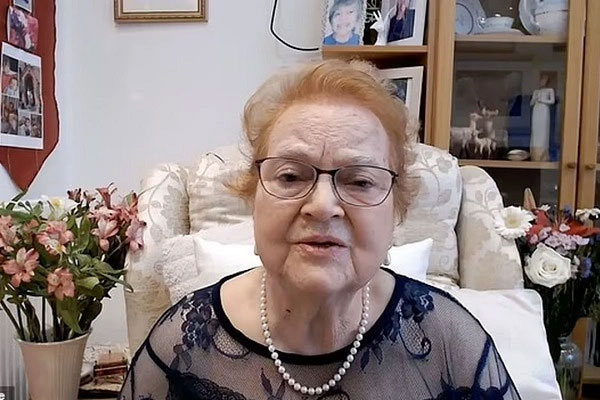Right now, you can create a digital version of yourself or a loved one, complete with a lifelike voice and memories.
In 2013, Netflix aired an episode of Black Mirror about a woman who loses her partner. In her grief, she turns to a service that can “recreate” a digital version of her partner based on data from social media accounts. Thanks to advancements in AI technology and voice replication, this scenario has become a reality.
“They tell me personal stories I’ve never heard, recounting my childhood and giving me life advice. It’s fascinating,” Charlotte Jee from Technology Review recounted her phone conversation with her digital “parents.”
These digital parents exist within an app on her phone, similar to virtual assistants like Siri or Alexa, created by HereAfter AI based on over four hours of interviews with real people.
Grief Technology
Grief tech is the field that companies like HereAfter are pursuing. Just as fintech refers to technology products for financial services, grief tech encompasses technology products designed for times of sorrow, such as when losing a loved one.
Instead of traditional solutions like counseling and therapy, grief tech companies aim to create a digital version that embodies the voice and memories of the deceased. “Never have to say goodbye” is the slogan of You, Only Virtual, another company in this space.

Actor William Shatner recorded by grief tech company StoryFile to recreate a digital version. (Photo: StoryFile).
Today’s large language models (LLMs) can engage in text conversations so convincingly that some, like former Google engineer Blake Lemoine, argue they possess sentience. LLMs such as OpenAI’s GPT-3 or Google’s LaMDA can even be fine-tuned to mimic the writing style and messaging of a specific individual by using their written content as training data.
The ability of AI to replicate voices is also improving. In June, Amazon shared a clip of a boy hearing his grandmother read a passage from The Wizard of Oz. The twist? His grandmother had passed away, and this reading was recreated by Amazon based on an audio recording lasting less than a minute.
“While AI cannot erase the pain of loss, it can extend the memories of those who have passed“, promised Rohit Prasad, Alexa’s chief scientist, regarding the grief tech that his company is developing.
The First Digital Versions
To create the most lifelike version possible, companies need detailed and personalized data. HereAfter’s first step involves interviewing subjects while they are still alive. Technicians ask about everything from childhood memories to thoughts on death.
Weeks after the interview, Jee received her “virtual parents” via an email attachment, accessible through the Alexa app on her phone. Some phrases sounded unclear and foreign, especially when the “virtual parents” guided her on how to converse and ask questions, but when recounting memories, their voices became more natural and familiar, Jee noted.
Another company, StoryFile, aims to push this technology even further, allowing users to interact with the deceased through video rather than just voice. The person being “recreated” must be filmed while answering questions; the higher the quality of the recording, the more lifelike the result.
StoryFile will turn these videos into a digital version of the individual so that customers can engage in conversations as if on a video call.
Stephen Smith, the CEO of StoryFile, used this technology at his mother’s funeral. In the video, “Smith’s mother” is sitting on a sofa in the living room. With her flowing hair and friendly eyes, she converses with guests at her own funeral.

A still from the video of Smith’s digital mother speaking at the funeral. (Photo: Voicebot).
Smith told Technology Review that the presence of the digital version at the funeral provided comfort to him and his family.
The biggest issue with current technology is that anyone is created from a common “baseline,” according to Justin Harrison, founder of You, Only Virtual. “We want to create a unique experience for each individual,” Harrison stated.
The founder of You, Only Virtual believes that simply preserving memories will not recreate the relationship between the living and the deceased. His company is developing a communication platform that customers can use to message and converse with loved ones while they are still alive. This way, the digital version will have the habits and communication styles of a person, according to Harrison.
This is also what Harrison did with his mother, Melodi, who was battling terminal cancer. “I built it based on five years of messaging with her. The data spans thousands of pages,” Harrison said about his chatbot. The digital Melodi uses phrases and even emojis that Melodi would use, sometimes even making the same spelling mistakes.
Not Human
For some, hearing the voices of deceased loved ones can aid in the healing process. It’s not uncommon for people to listen to voicemails or recordings from someone who has just passed away, says Erin Thompson, a clinical psychologist specializing in grief. A digital version can be a helpful and healthy way to remember the deceased.

A chat exchange between Justin Harrison and the Melodi chatbot published by You, Only Virtual. (Photo: You, Only Virtual).
However, those who are grieving need to remember that these chatbots only mimic a small part of someone; they do not possess sentience and will not replace human relationships, Thompson warns.
Creating a digital copy of someone without consent also raises privacy issues, especially if the individual being recreated is still alive. Imagine how you would feel knowing there is a virtual version of you somewhere, under someone else’s control.
Some believe that mourning for those who have passed is one of the few aspects of life that has not, and should not, be dominated by modern technology.
Cost can also be a drawback. HereAfter’s unlimited version, which allows for as many conversations as desired to create a digital version of a person, costs $8.99 per month. StoryFile charges a one-time fee of $499. You, Only Virtual is expected to cost $10-20 per month upon its launch in 2023.


















































